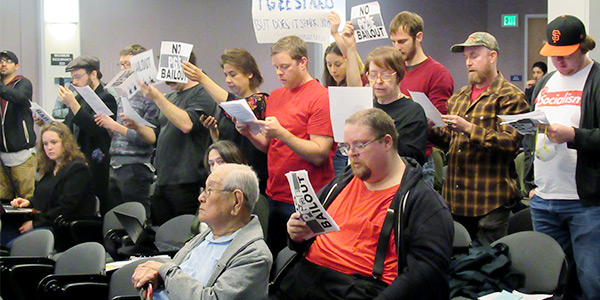By Hudson Sangree
SACRAMENTO, Calif. — Protesters at the Public Utilities Commission meeting on Thursday urged the commissioners to try to turn Pacific Gas and Electric into a publicly owned utility as part of its Chapter 11 reorganization that began when the company filed for bankruptcy protection Tuesday.

Protesters at Thursday’s CPUC meeting in Sacramento read aloud the names of those killed by wildfires. | © RTO Insider
“We have the opportunity to radically restructure what our energy system looks like — safe, public and one that ensures everyone the right to access,” said Morganne Blais-McPherson, a University of California, Davis student and co-chair of the university’s Young Democratic Socialists of America chapter.
Unlike recent protests at PUC meetings in San Francisco, the Sacramento gathering was relatively tame. Demonstrators didn’t disrupt the meeting or shout. They spoke only during public comment, mostly without going over the two-minute time limit set by PUC President Michael Picker.
The calm meeting capped off a tumultuous week of hearings and court filings involving PG&E and the PUC.
On Monday, the PUC called a hasty and controversial meeting to allow PG&E to obtain billions of dollars in debtor-in-possession (DIP) financing to see it through bankruptcy.
On Tuesday, just after midnight, the utility filed for bankruptcy in federal court in San Francisco. The first hearing in the bankruptcy case, which was mainly procedural, was held that afternoon. (See PG&E Wants to Undo Contracts, Revamp Biz in Bankruptcy.)

Protesters displayed signs during Thursday’s CPUC meeting in Sacramento. | © RTO Insider
On Wednesday, a judge considered whether to impose stringent new conditions on PG&E for violating criminal probation in the 2010 San Bruno gas line explosion case, and the State Assembly held an oversight hearing of the PUC in which some lawmakers demanded that regulators do more to keep PG&E and other utilities from sparking deadly wildfires. (See related story, Lawmakers Grill CPUC President on PG&E, Fires.)
Another bankruptcy hearing started Thursday morning in San Francisco, about the same time the PUC was meeting in Sacramento. (See related story, Judge Postpones Strict Probation Conditions for PG&E.)
Seth Sanders, a member of the Democratic Socialists of America, said that as a parent and ratepayer, he was upset to see PG&E seek bankruptcy protection when it is suspected of starting November’s Camp Fire, which killed 86 people and destroyed the town of Paradise.
“I have been sick to my stomach,” Sanders told commissioners. “This is a terrible insult to the memories of the dead.”

Protesters listen to the CPUC proceedings during Thursday’s meeting in Sacramento. | © RTO Insider
Sanders and other protesters called for a restructuring of PG&E into municipal systems, citing the Sacramento Municipal Utility District as a model. Their statements were met with quiet finger snapping from other demonstrators, some of whom stood holding signs.
(San Francisco officials have said publicly they might be interested in taking over PG&E’s assets in the city and forming a municipal utility.)
At one point, protesters read aloud the names of about 40 fire victims, as they have done at other PUC meetings.
“Unless you do something, you’re going to get us all killed,” Robert Henderson told the commissioners during the public comment period.

Mary Kay Benson, of Butte County, Calif., said many of those who died in the Camp Fire were senior citizens, like her. | © RTO Insider
Mary Kay Benson said she was from Chico, the neighboring town to Paradise in largely rural Butte County. Many of the dead were senior citizens, like her, Benson said.
“Are we all just corporate collateral?” she asked the commissioners.
Pete Woiwode, of Oakland, said he was at Monday’s raucous meeting in San Francisco, when the PUC approved PG&E’s DIP financing with little public notice and over the objections of demonstrators.
“That should not have happened,” Woiwode said.



